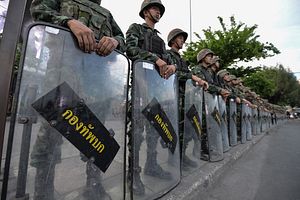As we welcome the new year, we look back and review the top news stories in the Southeast Asian region in the past 12 months. These news events were also widely reported and discussed in the international media:
1. Thailand coup. After months of intense street protests, the army of Thailand intervened on May 22 and declared martial law. An interim constitution was drafted which led to the establishment of a military-backed civilian government. General Prayuth Chan-ocha was declared the country’s 29th prime minister.
2. MH370, MH17, Air Asia QZ8501. There were 239 passengers and crew members onboard Malaysian Airlines flight MH370, which disappeared in March and remains missing to this day. Malaysian Airlines flight MH17 was hit by a missile in eastern Ukraine in July, killing all 298 passengers and crew members. Meanwhile, the crash site of Air Asia Flight QZ8501, which went missing on December 27 carrying 162 people, was located yesterday by a multi-country search party on the south Sumatra side of Indonesia.
3. Jokowi’s election victory. Jakarta Governor Joko Widodo, popularly known as Jokowi, was elected president of Indonesia. As a politician, he became famous for his non-traditional approach to leadership, such as making unannounced visits to government offices to check if civil servants were working efficiently. Jokowi’s victory was instantly hailed as a major boost to Indonesia’s democracy, since it is the first time that the country’s president will have no ties to either the military or Suharto, who ruled as dictator for more than three decades.
4. Brunei implements Sharia Law. Sharia law took effect in Brunei last May, making it the first country in East Asia to implement the law at the national level. The first phase in implementing the law covered general offenses such as eating in public during the fasting month of Ramadan, failing to perform Friday prayers, or becoming pregnant out of wedlock. The second phase includes amputation for theft, and flogging for violations such as abortion, alcohol consumption, and homosexuality. The death penalty will be applied during the third phase, which would involve stoning to death for adultery, and also capital punishment for rape and sodomy
5. Opposition to the Laos dam project. Laos has approved the construction of a mega dam along the Mekong River, despite the objections of Thailand, Vietnam, and Cambodia. Laos’ neighbors and various environmental groups wanted more impact studies before the project is allowed to continue.
6. Maritime disputes in the South China Sea. China continues to wrangle with Vietnam and the Philippines over the ownership of several territories in the South China Sea (or West Philippine Sea). It has been accused of violating the sovereignty of several ASEAN nations by building or placing several structures within the disputed waters. A decision by an international arbiter about the competing maritime claims next year will certainly make it a focal issue in the Asia-Pacific.
7. Cambodia’s garment strike. Thousands of garment workers joined a strike in Cambodia, demanding an increase in their monthly minimum wages. But the strike was violently dispersed by the police last January and public rallies were banned in the capital Phnom Penh. The campaign also urged global clothing brands to ensure that their suppliers in Cambodia are respecting labor rights.
8. Cambodia’s opposition party joins Parliament. After 10 months of boycotting the parliament in protest at the alleged widespread election fraud, Cambodia’s 55 opposition members agreed to take their oath as members of the Parliament last August. This allowed the opposition to articulate its agenda in the parliament, although observers noted that it also boosted the leadership of Hun Sen, the country’s prime minister for the past three decades.
9. Malaysia to strengthen Sedition Act. Prime Minister Najib Razak reneged on his election promise to scrap the Sedition Act and instead announced that his government would reform and strengthen the law, which was enacted by the British colonial government in 1948. Several lawyers, journalists, activists and even academics were charged with sedition this year, which pushed various groups to broaden the coalition opposing the law.
10. Myanmar assumes chairmanship of the Association of Southeast Asian Nations. Domestic troubles have colored Myanmar’s role as rotating chairman of the ASEAN. However, its leadership in the ASEAN in 2014 is not only historic but crucial as the region takes key steps to prepare for the ASEAN 2015 integration.
11. Post-Haiyan recovery effort in the Philippines. Haiyan was the strongest typhoon in recorded history, striking several Visayas islands in the Philippines in November 2013. It rallied the international community to assist in the rehabilitation efforts while climate activists cited it as an example of the harsh impact of global warming. Meanwhile, in Malaysia, last week’s heavy rainfall caused the worst flooding in the eastern states in the past three decades.
Will 2015 bring change to the region? What is certain is that the coming year will be a historic one, with Southeast Asia already transitioning to an integrated ASEAN community in the next few months.

































